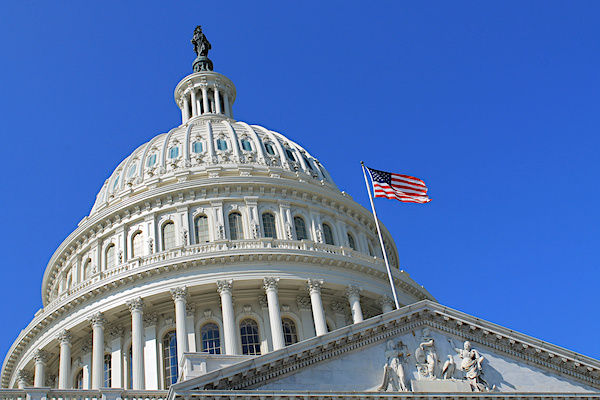
WASHINGTON — Democratic leaders slammed Republicans Friday for leaving in the lurch millions of jobless Americans who are relying on enhanced unemployment benefits to stay financially afloat amid ongoing public health and economic crises.
Republicans in Congress and the White House were engaged in heated negotiations this week over the details of their party’s proposal for a fifth coronavirus package.
Senate Majority Leader Mitch McConnell (R-Ky.) was expected to unveil the details of the proposal but adjourned without doing so, virtually ensuring a gap in benefits.
“The administration has requested additional time to review the fine details, but we will be laying down this proposal early next week,” McConnell said on the Senate floor Thursday. “We have an agreement in principle on the shape of this package.”
In the meantime, the benefits — which amount to $600 a week in addition to state unemployment aid — are set to expire this weekend. A moratorium on evictions approved in an earlier relief package is also ending, which could spur a spike in homelessness.
Both provisions were authorized in a $2.2 trillion coronavirus relief package approved in March.
About 30 million workers — or roughly one in five — are collecting jobless benefits, according to The New York Times.
At the same time, schools are preparing to reopen as COVID-19 infections surge across the country and health care workers face new shortages of masks, gloves and other protective equipment as the virus spreads.
House Speaker Nancy Pelosi (D-Calif.) and Senate Minority Leader Chuck Schumer (D-N.Y.) pressed McConnell Friday to move the legislation forward immediately.
“We had expected to be working throughout this weekend to find common ground on the next COVID response package,” the Democratic leaders said in a joint statement Friday. “It is simply unacceptable that Republicans have had this entire time to reach consensus among themselves and continue to flail. Time is of the essence and lives are being lost.”
Congress is scheduled to adjourn in August for its summer recess, but House leaders have said they may delay the break if needed to reach a deal. After Congress adjourns, prospects for bipartisan compromise will likely cool as the election season heats up.
House Democrats offered their starting point for negotiations more than two months ago, when they passed a $3 trillion bill that would extend current unemployment benefits through January 2021. The bill would also send another round of direct $1,200 payments to eligible adults, and it has $175 billion to help Americans make rent and mortgage payments.
It would also expand a loan program for small businesses; strengthen an employee retention tax credit; provide more money for testing, tracing and treating COVID-19; bolster food security programs; and provide resources to ensure safe elections and other government functions.
Another key provision: about $1 trillion for state, local, territorial and tribal governments to help them continue services and programs.
A more ‘targeted’ approach
Republicans are considering a more “targeted” approach with a price tag reportedly around $1 trillion.
GOP Sens. Charles Grassley of Iowa, Lamar Alexander of Tennessee, Susan Collins of Maine, Marco Rubio of Florida and others are spearheading various provisions of the proposal and will introduce various components on Monday, McConnell said Thursday.
Whether to extend unemployment benefits — and by how much — is a main sticking point among Republicans. Some don’t want additional support, others want scaled-back support and still others want to extend the current level of benefits, according to Politico.
McConnell has thumbed his nose at the latter option, which he says disincentives employment because benefit levels are higher than many people would otherwise earn. But he said Thursday Republicans intend to continue “some” supplemental support while “fixing the obvious craziness of paying people more to remain out of the workforce.”
As of Friday, members of his party were struggling to figure out how to “cut but not eliminate” the benefit, according to The Washington Post.
One possibility under discussion would have the effect of reducing benefits for a typical jobless worker by $400 per week, which Schumer said would cause significant harm.
“That’s right, America,” Schumer said Thursday. “If you’ve lost your job through no fault of your own, and can’t go back to work because this administration has mismanaged the crisis, Republicans want you to take a pay cut in the middle of this crisis.”
In laying out the broad contours of the package Thursday, McConnell said the GOP package would also provide “north of $100 billion” to help schools reopen safely, as well as support for child care providers and elementary and secondary schools; another round of direct payments to eligible households; and a “sequel” to a federal loan program for small businesses that continue to pay workers.
It will also contain more resources for hospitals and health care workers, treatment and vaccine development and policies to shield seniors from spikes in insurance premiums; incentivize retention; encourage rehiring of laid-off Americans; and help businesses obtain protective equipment, testing, and other supplies.
And it will include liability protections to shield schools, businesses and other organizations from coronavirus-related lawsuits as they reopen — a red line for the GOP leader.
“Our country is in a complex middle ground between those two things,” he said on the Senate floor Tuesday. “We can’t go back to April, and we can’t snap our fingers and finish the vaccine overnight. We need to carve out a “new normal.”
U.S. Treasury Secretary Steven Mnuchin told CNBC Thursday that the GOP base package won’t include a payroll tax cut, despite President Donald Trump’s support for the provision.
In laying out the bill Thursday, McConnell did not mention food assistance, hazard pay for essential workers, rental assistance or an extension of the moratorium on evictions. Nor did he mention new funding for state, local, territorial and tribal governments, many of which are facing massive revenue shortfalls as a result of shutdown orders.
In March, Congress set aside $150 billion to help municipalities with more than 500,000 people respond to the pandemic.
“Remarkably, the likely centerpiece of the Republican legislative response to COVID is not an aid package for the 20-30 million unemployed Americans, or a massive influx of resources to test and trace and finally stop the spread of this evil disease,” Schumer said on the Senate floor Thursday. “Once again, the Republican Senate is far more comfortable providing relief to big corporations than relief to American workers and American families.”




